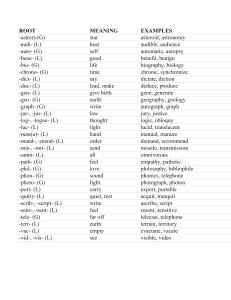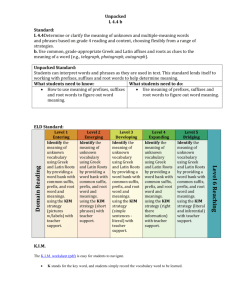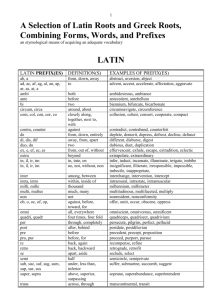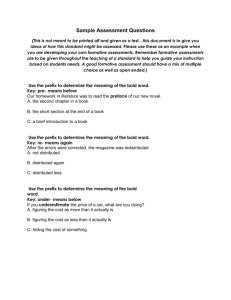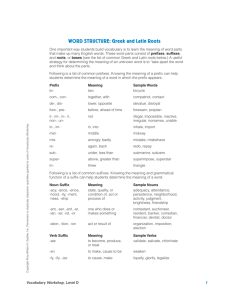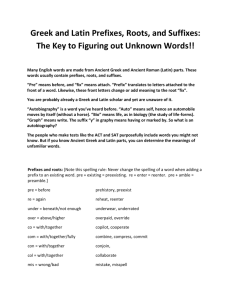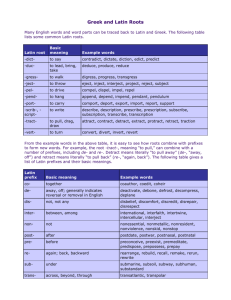class article - Ms. Hoefer`s Totally Awesome Website
advertisement
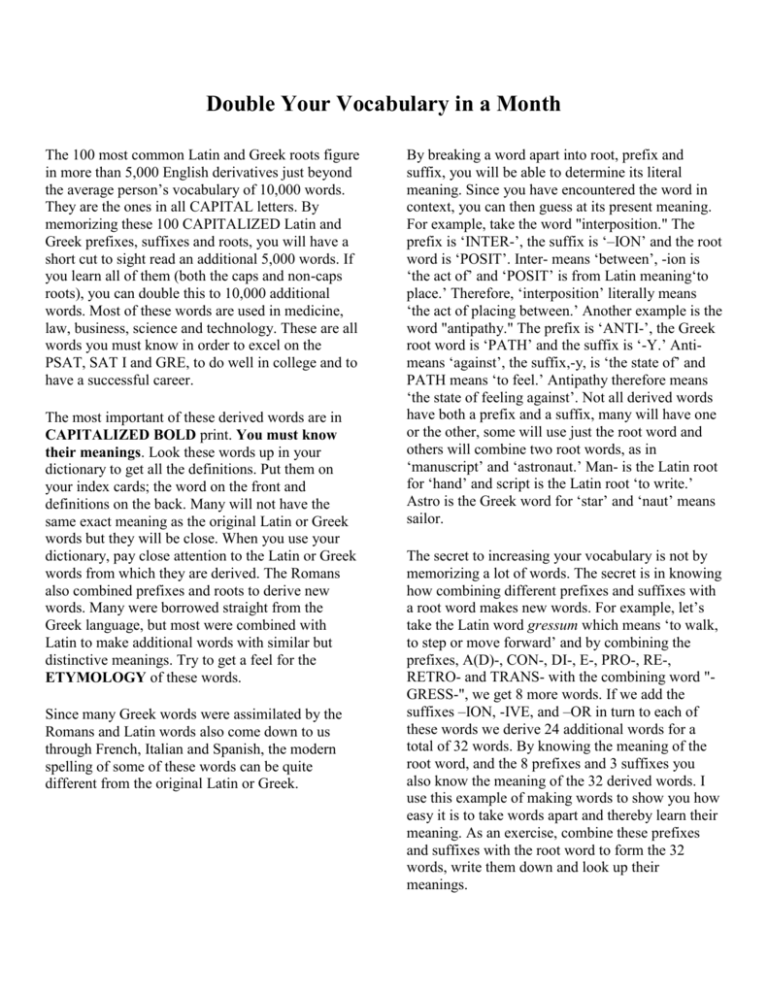
Double Your Vocabulary in a Month The 100 most common Latin and Greek roots figure in more than 5,000 English derivatives just beyond the average person’s vocabulary of 10,000 words. They are the ones in all CAPITAL letters. By memorizing these 100 CAPITALIZED Latin and Greek prefixes, suffixes and roots, you will have a short cut to sight read an additional 5,000 words. If you learn all of them (both the caps and non-caps roots), you can double this to 10,000 additional words. Most of these words are used in medicine, law, business, science and technology. These are all words you must know in order to excel on the PSAT, SAT I and GRE, to do well in college and to have a successful career. The most important of these derived words are in CAPITALIZED BOLD print. You must know their meanings. Look these words up in your dictionary to get all the definitions. Put them on your index cards; the word on the front and definitions on the back. Many will not have the same exact meaning as the original Latin or Greek words but they will be close. When you use your dictionary, pay close attention to the Latin or Greek words from which they are derived. The Romans also combined prefixes and roots to derive new words. Many were borrowed straight from the Greek language, but most were combined with Latin to make additional words with similar but distinctive meanings. Try to get a feel for the ETYMOLOGY of these words. Since many Greek words were assimilated by the Romans and Latin words also come down to us through French, Italian and Spanish, the modern spelling of some of these words can be quite different from the original Latin or Greek. By breaking a word apart into root, prefix and suffix, you will be able to determine its literal meaning. Since you have encountered the word in context, you can then guess at its present meaning. For example, take the word "interposition." The prefix is ‘INTER-’, the suffix is ‘–ION’ and the root word is ‘POSIT’. Inter- means ‘between’, -ion is ‘the act of’ and ‘POSIT’ is from Latin meaning‘to place.’ Therefore, ‘interposition’ literally means ‘the act of placing between.’ Another example is the word "antipathy." The prefix is ‘ANTI-’, the Greek root word is ‘PATH’ and the suffix is ‘-Y.’ Antimeans ‘against’, the suffix,-y, is ‘the state of’ and PATH means ‘to feel.’ Antipathy therefore means ‘the state of feeling against’. Not all derived words have both a prefix and a suffix, many will have one or the other, some will use just the root word and others will combine two root words, as in ‘manuscript’ and ‘astronaut.’ Man- is the Latin root for ‘hand’ and script is the Latin root ‘to write.’ Astro is the Greek word for ‘star’ and ‘naut’ means sailor. The secret to increasing your vocabulary is not by memorizing a lot of words. The secret is in knowing how combining different prefixes and suffixes with a root word makes new words. For example, let’s take the Latin word gressum which means ‘to walk, to step or move forward’ and by combining the prefixes, A(D)-, CON-, DI-, E-, PRO-, RE-, RETRO- and TRANS- with the combining word "GRESS-", we get 8 more words. If we add the suffixes –ION, -IVE, and –OR in turn to each of these words we derive 24 additional words for a total of 32 words. By knowing the meaning of the root word, and the 8 prefixes and 3 suffixes you also know the meaning of the 32 derived words. I use this example of making words to show you how easy it is to take words apart and thereby learn their meaning. As an exercise, combine these prefixes and suffixes with the root word to form the 32 words, write them down and look up their meanings.

